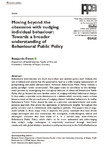Citation link:
http://dx.doi.org/10.25819/ubsi/9885| DC Field | Value | Language |
|---|---|---|
| crisitem.author.orcid | 0000-0002-1837-3898 | - |
| dc.contributor.author | Ewert, Benjamin | - |
| dc.date.accessioned | 2021-03-19T12:28:20Z | - |
| dc.date.available | 2021-03-19T12:28:20Z | - |
| dc.date.issued | 2019 | de |
| dc.description | Finanziert aus dem DFG-geförderten Open-Access-Publikationsfonds der Universität Siegen für Zeitschriftenartikel | de |
| dc.description.abstract | Behavioural interventions are much more than ‘just another policy tool’. Indeed, the use of behavioural science has the potential to lead to a wide-ranging reassessment of policymaking and public administration. However, Behavioural Public Policy remains a policy paradigm ‘under construction’. This paper seeks to contribute to this development process by investigating the conceptual features of advanced Behavioural Public Policy that go beyond the now familiar notion of nudging individual behavioural change. It thus seeks to provide more illumination in a debate which currently seems to have become stuck on the pro and cons of nudging citizens’ individual behaviours. In reality, Behavioural Public Policy should be seen as a pluralist, non-deterministic and multipurpose approach that allows the application of behavioural insights ‘throughout the policy process’ and in combination with regulatory policies. The paper’s line of argument unfolds in three steps. First, it explores the policy rationales that have driven nudge techniques and also summarises the conceptual, methodological, ethical and ideological criticisms that have made of it. In a second step, state-of-the-art Behavioural Public Policy, which claims to be more substantial and wide-ranging than today’s nudge techniques, is empirically examined through interviews conducted with global thinkers (academics and practitioners) in the field of behavioural insights. Finally, there is a discussion of whether advanced Behavioural Public Policy could be better suited to withstand the criticisms that have been directed at nudge techniques. | en |
| dc.identifier.doi | http://dx.doi.org/10.25819/ubsi/9885 | - |
| dc.identifier.uri | https://dspace.ub.uni-siegen.de/handle/ubsi/1877 | - |
| dc.identifier.urn | urn:nbn:de:hbz:467-18779 | - |
| dc.language.iso | en | de |
| dc.source | Public Policy and Administration 2020, Vol. 35, Issue 3, S. 337-360. - https://doi.org/10.1177/0952076719889090 | de |
| dc.subject.ddc | 320 Politik | de |
| dc.subject.other | Behavioural insights | en |
| dc.subject.other | Behavioural public policy | en |
| dc.subject.other | Expert interwiews | en |
| dc.subject.other | Nudge | en |
| dc.subject.other | Policy making | en |
| dc.subject.other | Policy process | en |
| dc.subject.swb | Staatstätigkeit | de |
| dc.subject.swb | Nudge | de |
| dc.subject.swb | Verhaltensökonomie | de |
| dc.subject.swb | Experteninterview | de |
| dc.title | Moving beyond the obsession with nudging individual behaviour: towards a broader understanding of behavioural public policy | en |
| dc.type | Article | de |
| item.fulltext | With Fulltext | - |
| ubsi.publication.affiliation | Seminar für Sozialwissenschaften | de |
| ubsi.source.author | SAGE Publications | de |
| ubsi.source.issn | 1749-4192 | - |
| ubsi.source.issued | 2020 | de |
| ubsi.source.issuenumber | 3 | de |
| ubsi.source.link | https://us.sagepub.com/en-us/nam/home | de |
| ubsi.source.pagefrom | 337 | de |
| ubsi.source.pageto | 360 | de |
| ubsi.source.place | Thousand Oaks | de |
| ubsi.source.publisher | SAGE Publications | de |
| ubsi.source.title | Public Policy and Administration | de |
| ubsi.source.volume | 35 | de |
| ubsi.subject.ghbs | PDH | de |
| Appears in Collections: | Geförderte Open-Access-Publikationen | |
Files in This Item:
| File | Description | Size | Format | |
|---|---|---|---|---|
| Ewert_Moving_beyond.pdf | 386.28 kB | Adobe PDF |  View/Open |
This item is protected by original copyright |
Page view(s)
426
checked on Dec 3, 2024
Download(s)
157
checked on Dec 3, 2024
Google ScholarTM
Check
Altmetric
Items in DSpace are protected by copyright, with all rights reserved, unless otherwise indicated.

